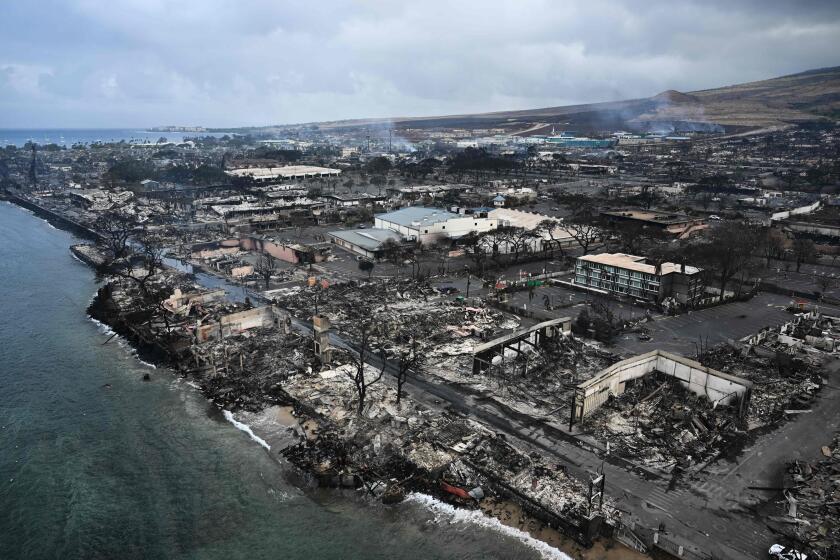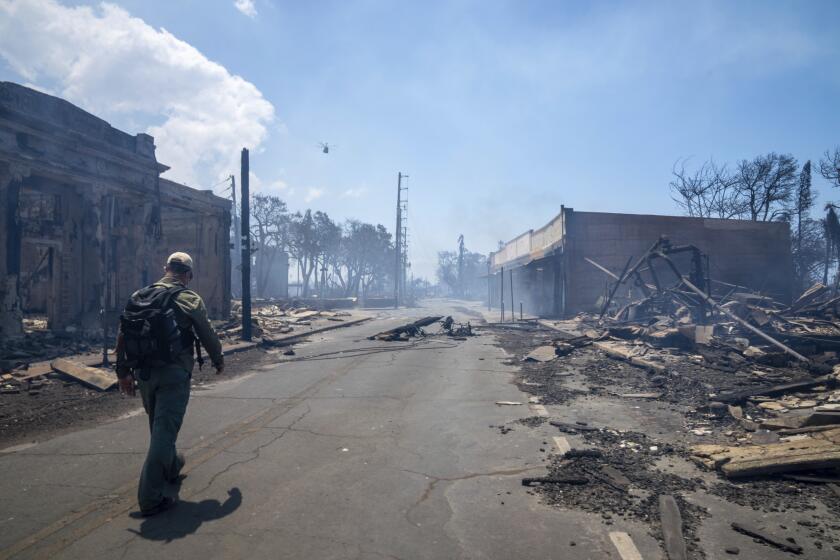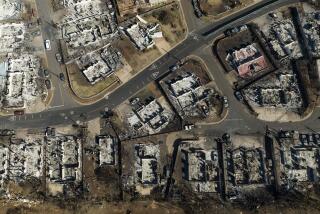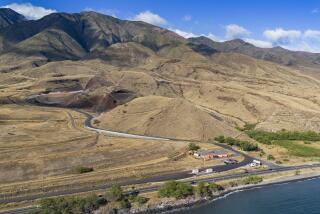Column: If the Maui fires don’t wake up Americans to the climate emergency, nothing will
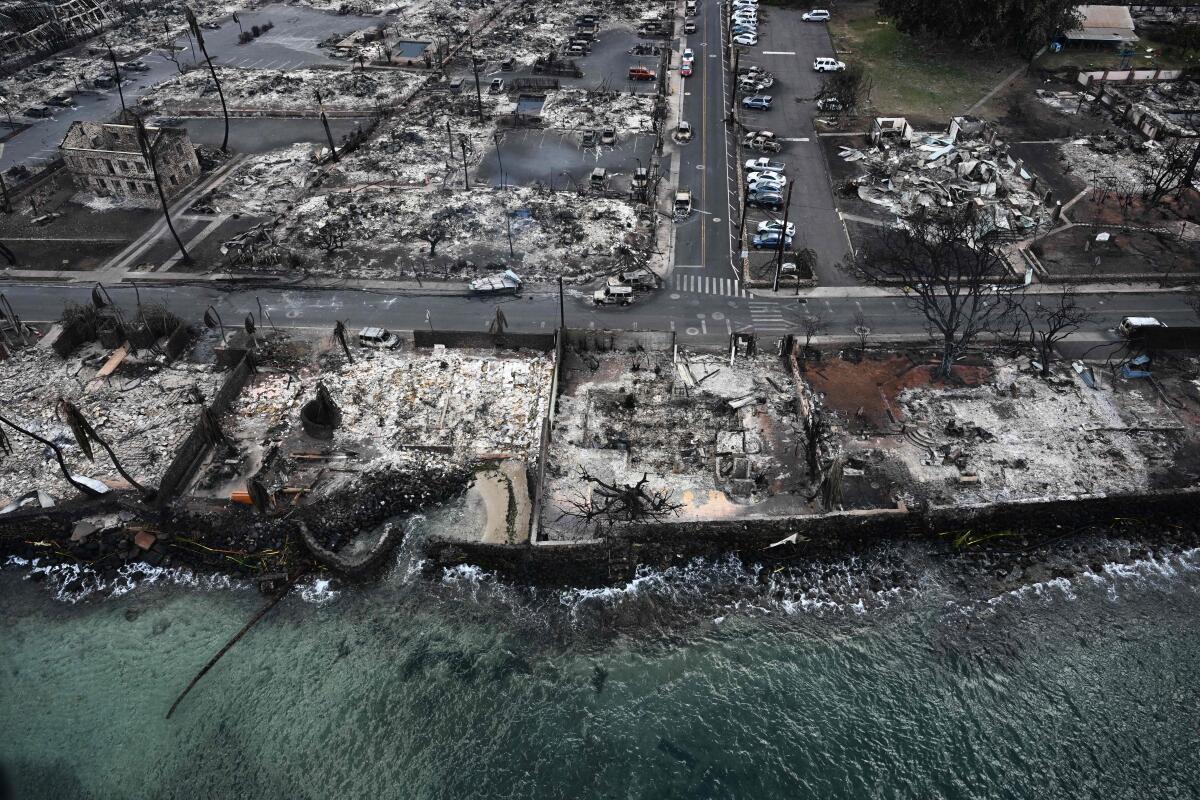
Will the devastating fires on Maui serve as a wake-up call for Americans and our foot-dragging political leaders about the climate emergency?
If they don’t, one fears nothing ever will.
For the record:
3:46 p.m. Aug. 11, 2023An earlier version of this story stated that a 150-year-old banyan tree had been burnt to ash; it was scorched but is still standing.
This week, the deadly combination of flash drought and an offshore hurricane — both increasingly common conditions as global temperatures rise — produced a catastrophic fire that destroyed the historic city of Lahaina.
In what Hawaii Gov. Josh Green called the worst natural disaster in Hawaii’s history, at least 67 are dead and more than 1,000 are missing.
Homes, hotels, churches, temples, museums and historic buildings have been reduced to ash, displacing thousands of surviving residents and sending hundreds of tourists back to their home states, thankful to be alive.
As terrible as the numbers and images emerging from the fire have been, it would be disingenuous to call them shocking. Climate change-related death tolls and community devastation have become horrifyingly common. In recent years, wildfires have ravaged Western states and their residents; increasingly strong storm patterns have pounded the East and the South; and deadly “heat domes” have clamped over the Southwest and Midwest.
As scientists of every climate and meteorological stripe have been telling us for years, catastrophic weather is a byproduct of rising temperatures caused by human-made emissions and, failing swift and resolute intervention, it is only going to get worse.
Yet even as people burn, drown, die from heat or falling debris, even as this country continues to lose homes, landmarks, communities and businesses, industry leaders and elected officials continue to use “climate change” as a political football.
Fires across Maui have destroyed buildings and lead to at least six deaths. Photos from space show the scale of the destruction.
Environmental disaster in blue states was seen, by some, as proof that “liberal” attempts to control emissions have failed, and in red states as proof of “conservative” willingness to sacrifice the future rather than admit error or spend money.
All of which allows too many of us to ignore the one thing that unites us all: the need to lower human-made emissions before the Earth becomes uninhabitable.
Maybe Maui will finally change our minds.
Even in our increasingly hostile political environment, Hawaii remains common ground: Everyone loves Hawaii, Maui in particular; it is this country’s island paradise.
Invariably topping popular U.S. tourist destinations, it is the site of weddings, honeymoons and family vacations that span generations. Like many of their class and generation, my grandparents never traveled anywhere, but after scrimping and saving they did, finally, make it to Hawaii.
Photos of those homes, hotels, churches, temples and historic buildings now smoldering in Lahaina still live in photo albums (physical and digital) across the country. How many people have kissed their beloved, embraced far-flung relatives or held squirming kids still for a picture beneath the 150-year-old banyan tree now standing scorched amid the rubble.?
Californians may mourn the charred Joshua tree, Floridians the loss of Fort Myers Beach and Sanibel Island. But Maui, even more than Yosemite and its redwoods, is a beloved part of the cultural imagination. To mainlanders, Hawaii means escape; a place of shared memory and aspiration, its name immediately evokes lush foliage, white sands and blue water. Oprah has a home there, and she could have a home anywhere.
If this tropical island paradise, where so many of us have some of our best memories, can burn, how can anywhere be safe?
It can’t.
A windswept fire invaded a historic town in Maui this week, setting in motion a familiar and terrifying chain of events.
The Hawaii of our memory and imagination no longer exists and, frankly, has not for a while. The state, which has the highest cost of living in the country, has struggled for years with the ever-increasing demands of tourism. Shut down in 2020 during the COVID-19 pandemic, Hawaii reopened its borders in 2021; the tourist rush that ensued left many residents begging mainlanders to stay away.
Pandemic aside, tourism in general inevitably puts environmentally damaging pressure on overly visited spots, causing pollution, soil erosion, high water usage and a disruption to local flora and fauna. On a group of relatively small islands, these impacts are exacerbated.
The increasing loss of sugar and pineapple plantations in Hawaii has left acres of abandoned farmland vulnerable to invasive grasses; on Maui, these grasses, grown dry in sudden drought, contributed to the speed and power of the fire.
That fantasy of Hawaii as an “escape from it all” is, and should be, forever punctured — a reminder that no place is safe from the damage humans have done to the atmosphere and the increasingly unpredictable and deadly weather patterns that damage has caused.
Nowhere is safe from the impact of warmer oceans and a rising global temperature, which can turn an idyllic town into a maelstrom of fire in a matter of hours. Not even Hawaii.
And if we won’t work, and vote, to protect our own communities from the ravages of our broken atmosphere, maybe we will fight climate change for the sake of a place beloved by all, for our own island paradise.
Maybe, finally, we’ll do it for Maui.
More to Read
Sign up for Essential California
The most important California stories and recommendations in your inbox every morning.
You may occasionally receive promotional content from the Los Angeles Times.
